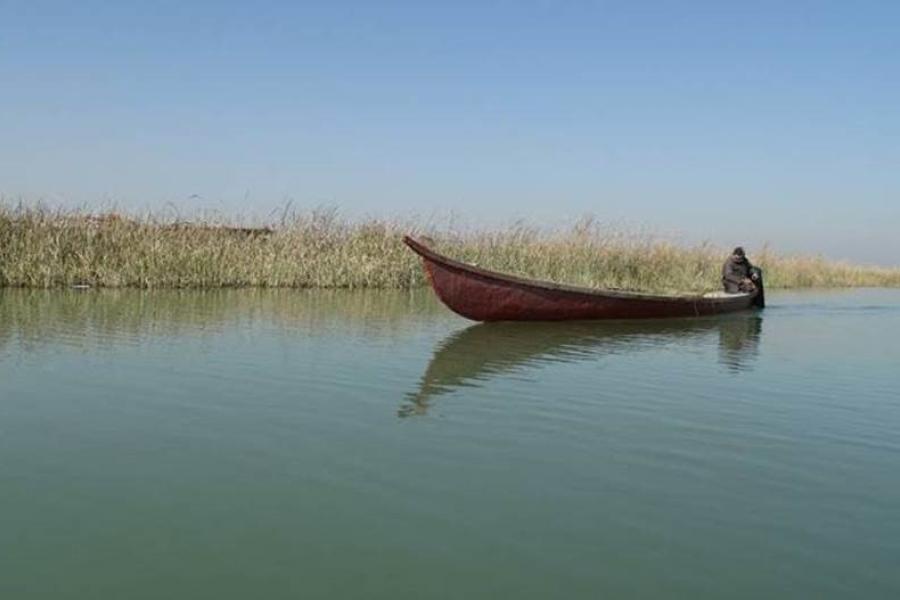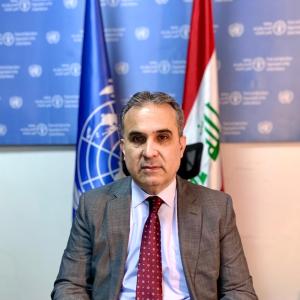World Water Day 2021 UN stresses awareness and the need for collective action to safeguard water resources in Iraq
22 March 2021
Baghdad : On the World Water Day on 22 March, the Food and Agriculture Organization of the United Nations (FAO) is raising awareness about the global water crisis.

We support any action to achieve Sustainable Development Goal (SDG) 6: water and sanitation for all by 2030. Water sustains life, impacts on food sustainability, the environment, the economy, and even human security. As such, it is vital that we collectively safeguard this critical resource for the benefit of everyone.
On this day, we emphasize the need for collective action bringing together governments, businesses, NGOs, media and local communities. “Water is a fundamental basic need for human survival. Without water, there would be no life on earth. I can assure you that the UN family in Iraq is supporting initiatives that lead to improved water management in accordance with the Paris Agreement on climate change,” said the UN Resident Coordinator for Iraq, Irena Vojáčkova-Sollorano.
The theme in 2021 is “Valuing Water.” In Iraq, we raise awareness of increased water scarcity in agriculture as the main user of all water withdrawals (70 percent) due to: i) decrease in the availability of fresh surface water; ii) increase in-country population and individual water consumption; iii) evaporation in dams, water bodies, open irrigation canals, and soils; iv) increase in salinity, desertification and soil erosion; and v) environmental pollution.
The Government of Iraq, FAO, and the Ministry of Foreign Affairs of the Netherlands (as the donor) are working together to support Iraq in its participation in the second phase of FAO’s inter-regional project on Monitoring Water Productivity using Remote Sensing (WaPOR). The five-year programme monitors water productivity through open-access of remotely sensed derived data, assists countries in monitoring water productivity, identifying water productivity gaps, proposing solutions to reduce these gaps and contributing to a sustainable increase of agricultural production. At the same time, it takes into account ecosystems and the equitable use of water resources, which eventually leads to an overall reduction of water stress.
Dr. Salah ElHajj Hassan, FAO Representative for Iraq, said that solid evidence is required to inform policy decisions towards achieving SDG 6. “Let us celebrate World Water Day together and give greater care to water utilization inside and outside of our homes,” he added.

He started his career in 1984, as Senior Research Assistant in the Agricultural Research and Education Centre (AREC), American University of Beirut. From 1987 to 1991, he was Coordinator of the Student Training Programme, and also Agriculture and Horticultural Teacher for the Faculty of Agriculture, at the Lebanese University.
From 1991 to 1995, he worked as Agricultural Engineer at the Ministry of Agriculture, Bekaa Regional Office, Zahlah and was then assigned to the Agricultural Research Institute in the Tal Amara station, first as Head of the Crop Production Department and subsequently in charge of the Plant Protection Laboratory. From 2002 to 2006, he was Director of the Kfardane Research Station (Agricultural Research Institute). In 2008, he became Visiting Scientist at the International Maize and Wheat Improvement Centre (CIMMYT) and Coordinator of a project with the International Centre for Atomic Energy Agency, Vienna.
In 2010, he served as Advisor to the Minister for Agriculture of Lebanon. In 2011, he became President of the Pesticide Scientific Committee, Head of the Phytoplasma Committee and Director of the Agriculture and Rural Development Programme (ARDP) (EU-funded project). From 2010 to 2013, he represented Lebanon in negotiations with EU, Egypt, Jordan and Iraq. During his career, Mr Hajj Hassan also carried out a number of other functions. He represented the Lebanese Agricultural Research Institute (LARI) in several research programmes with the International Centre for Agricultural Research in the Dry Areas (ICARDA) and the American University of Beirut. He was Coordinator of the Mashreq/Maghreb project with ICARDA, representing Lebanon in the Steering Committee, as well as being the Head of the Sugar-beet Delivery and of the Wheat Delivery Committees. For a number of years, Mr Hajj Hassan worked for the preparation of FAO TCP projects and served as the National Director of a TCP project. He joined FAO in January 2014 as FAO Representative in Yemen. Mr Hajj Hassan succeeds Mr El Zubi as FAO Representative in Iraq.



